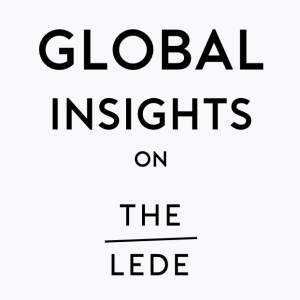Episodes

23 minutes ago
23 minutes ago
Was Zohran Mamdani’s victory in the Democratic primary for New York city’s mayoral election a transformation for progressive politics in the United States and abroad, or a local poll that is unlikely to mark a wider shift? New Lines’ Faisal Al Yafai is joined by the magazine’s Online Editor Christin El-Kholy, Politics Editor Danny Postel and South Asia Editor Surbhi Gupta.
Produced by Finbar Anderson

Friday Jun 27, 2025
Friday Jun 27, 2025
Whatever their initial war aims, the political consequences of the 12-day Iran-Israel war might not have been foreseen by either side, academic Nahid Siamdoust and political analyst Ori Goldberg tell New Lines’ Faisal Al Yafai on Global Insights on The Lede.
Produced by Finbar Anderson

Friday Jun 20, 2025
Friday Jun 20, 2025
White House reporter Alex Thompson joins Faisal Al Yafai on the podcast to discuss “Original Sin,” his bestselling book, co-authored with CNN anchor Jake Tapper, on the cover-up that hid Joe Biden’s declining health from the public and the devastating political fallout that resulted from it.
Produced by Finbar Anderson

Friday Jun 13, 2025
Friday Jun 13, 2025
Reporter James Bloodworth joins New Lines’ Faisal Al Yafai on The Lede to discuss how developments in technology have left young men vulnerable to online personalities from Andrew Tate to Jordan Peterson, his own experience navigating masculinity in the 2000s, and his new book, “Lost Boys: A Personal Journey Through the Manosphere.”
Produced by Finbar Anderson

Friday Jun 06, 2025
Friday Jun 06, 2025
Fawaz Gerges joins New Lines' Faisal Al Yafai on the podcast for a wide-ranging discussion on why the Middle East is so often misunderstood, as set out in Gerges’ new book, “The Great Betrayal: The Struggle for Freedom and Democracy in the Middle East.”
Produced by Finbar Anderson

Friday May 30, 2025
Friday May 30, 2025
On this episode of Global Insights on The Lede, Günöl Tol, founding director of the Middle East Institute’s Turkish studies program, and Diego Cupolo, editor in chief of Turkey Recap, join New Lines' Kwangu Liwewe to discuss recent momentous developments in Turkish politics.
Produced by Finbar Anderson

Friday May 23, 2025
Friday May 23, 2025
On this week’s episode, Sonja Mejcher-Atassi joins New Lines’ Rasha Elass to discuss her new book, “An Impossible Friendship,” which describes a transformative friendship in the early years of the conflict in Palestine and Israel. Mejcher-Atassi and Elass consider what that relationship can tell us about Palestine today.
Produced by Finbar Anderson

Friday May 16, 2025
Friday May 16, 2025
After a long career at the forefront of the struggle for human rights, Kenneth Roth has plenty of insight into the complex strategic and moral issues involved in building the movement. The former executive director of Human Rights Watch debates those issues on The Lede with New Lines’ Finbar Anderson in a discussion of Roth’s new book, “Righting Wrongs: Three Decades on the Front Lines Battling Abusive Governments.”

Friday May 09, 2025
Friday May 09, 2025
On this episode of the podcast, Faisal Al Yafai considers whether terms like “oligarchy” can fully describe Donald Trump’s presidency or drive resistance to it. Featuring on the episode are the writer Sarah Chayes and New Lines’ Politics Editor Danny Postel.
Produced by Finbar Anderson

Friday May 02, 2025
Friday May 02, 2025
New Lines’ Faisal Al Yafai wonders whether making AI models that are truly fair for all users and uses can be possible. Hilke Schellmann joins to offer insights from her book “The Algorithm.”
Further listening:AI Is Transforming Geopolitics — with Bruno Maçães and Faisal Al YafaiAmerica’s Era of the Entrepreneur — with Erik Baker and Faisal Al Yafai
Produced by Finbar Anderson





